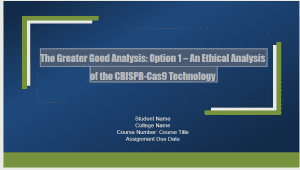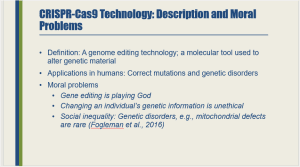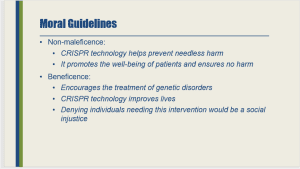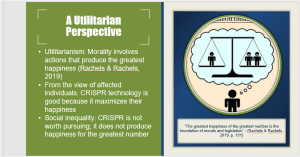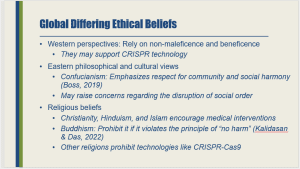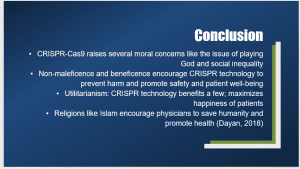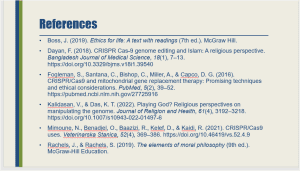The Greater Good Analysis – Option 1 – An Ethical Analysis of the CRISPR-Cas9 Technology
Hello. Today’s presentation on Greater Good Analysis focuses on the ethical analysis of the CRISPR-Cas9 technology, a recent technology with valuable healthcare applications. Welcome.
CRISPR stands for “clusters of regularly interspaced short palindromic repeats” (Mimoune et al., 2021). It is a repeating sequence in the genetic code of bacteria. CRISPR systems contain a scissor-like protein called Cas9 and a genetic GPS guide called gRNA (or guide RNA in full) (Mimoune et al., 2021). These systems allow the manipulation of genomes. Therefore, CRISPR-Cas9 is a molecular tool that can be used to alter genetic material, including human DNA. Accordingly, CRISPR technology can be applied to correct mutations and genetic disorders. Nonetheless, this technology creates moral problems, with some stating altering human DNA is playing God and others arguing that changing an individual’s genetics is unethical as it tampers with germline genetic information and the gene pool. Further, CRISPR technology also raises issues concerning social inequality. It could become an issue in social justice as some point out that it only helps a few in society, noting that genetic disorders, like mitochondrial defects, are rare (Fogleman et al., 2016).
Based on the moral principle of non-maleficence, I would argue that CRISPR technology helps prevent needless harm by correcting genetic disorders, thus promoting the well-being of patients, especially those with genetic disorders. Besides, this principle ensures that medical professionals deliver the CRISPR intervention in a manner that prevents harm and promotes safety.
Further, drawing insights from the principle of beneficence would help deal with the issue of social inequality. From this perspective, one would argue that CRISPR technology is worth pursuing because it helps improve lives regardless of whether a small number of people benefit. Besides, every life is important; therefore, denying any individual health care would be a social injustice.
The utilitarian moral theory postulates that morality concerns actions that produce the greatest happiness among the greatest number of people (Rachels & Rachels, 2019). Accordingly, from the view of individuals with genetic disorders, a utilitarian would support the pursuit of CRISPR technology to help prevent suffering among these individuals and maximize their happiness. Nonetheless, regarding the issue of social inequality, utilitarians would argue that this technology does not result in the happiness of the greatest number of people, as only a few are affected by genetic disorders. They would, therefore, conclude that CRISPR technology is not worth pursuing.
In ethical egoism, individuals are encouraged to pursue their self-interests exclusively since achieving one’s own happiness is the highest moral purpose (Rachels & Rachels, 2019). In this regard, an ethical egoist would support my moral guidelines concerning CRISPR technology. They would argue that pursuing this technology helps treat disorders, and it, therefore, helps affected individuals achieve happiness. Also, ethical egoism does not discourage individuals from helping others (Rachels & Rachels, 2019). Besides, one’s interests may coincide with the happiness of others. As such, treating the affected few would not be an issue because, in the long run, this means a healthy population where everyone can contribute to the success of others.
Some global ethical beliefs might agree with pursuing CRISPR technology, while others might disagree. For instance, Western perspectives are likely to center their position based on the principles of non-maleficence and beneficence, implying that they would argue in favor of CRISPR technology. On the other hand, Eastern philosophical and cultural views like Confucianism, which emphasizes respect for community and social harmony (Boss, 2019), may raise concerns regarding the disruption of social order brought about by CRISPR technology. Further, varying religions have differing views. For instance, Christianity, Hinduism, and Islam religions support an intervention like CRISPR technology (Kalidasan & Das, 2022). However, the Catholic Church only allows such interventions strictly for therapeutic purposes. Also, Buddhism may discourage gene editing if it violates the principle of “no harm” (Kalidasan & Das, 2022). In addition, some religions entirely prohibit CRISPR technology, noting that practicing it is playing God.
In summary, CRISPR-Cas9 is a healthcare technology that raises several moral concerns, including the issue of playing God. Also, some postulate that gene editing is unethical, and others note that genetic disorders are rare, so pursuing CRISPR technology is a waste of resources. However, the moral principles of non-maleficence and beneficence encourage pursuing CRISPR technology since it prevents needless harm and promotes safety and patient well-being. Moreover, analyzing these issues from different perspectives and ethical beliefs may draw opposing conclusions. For instance, proponents of utilitarianism may oppose the technology, saying that it only benefits a few in society. Still, from patients’ point of view, utilitarians may support CRISPR technology, noting that it reduces their suffering and maximizes happiness. At the same time, religious beliefs like Islamic law, which mandates physicians to save humanity (Dayan, 2018), promote the use of CRISPR technology to promote health.
ORDER A PLAGIARISM-FREE PAPER HERE
We’ll write everything from scratch
Question
Instructions
For this week’s assignment respond to one of the following options, and include Options 1, 2, or 3 as part of your heading.

The Greater Good Analysis – Option 1 – An Ethical Analysis of the CRISPR-Cas9 Technology
Option 1: The first option is to name and describe in detail a key specific and recent healthcare technology. What are at least two key moral problems this technology creates? What are the proper moral guidelines for dealing with it in your view? Compare your approach to what a utilitarian and ethical egoist would say (each independently). Consider whether differing ethical beliefs globally might or not agree with what you say.

